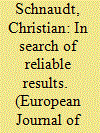| Srl | Item |
| 1 |
ID:
168323


|
|
|
|
|
| Summary/Abstract |
Governments and energy operators are frequently confronted with opposition to the construction of new high-voltage transmission lines. In this context, a recent experiment by Mueller et al. (2017) tested the so-called proximity hypothesis and found that spatial proximity to proposed transmission line corridor route alternatives significantly affected residents' likelihood of having negative risk expectations, showing low levels of support, and engaging in protest against the planned facility. Moreover, their findings suggest that the relationship between spatial proximity and the dependent variables is appropriately modeled by a distance decay function, showing that effects attenuate with increasing distance from the infrastructure site. Unfortunately, because of the fact that the study is the only one that has tested the proximity hypothesis in the context of planning new transmission lines so far, the existing evidence cannot be considered as a solid knowledge base. Therefore, to strengthen the reliability of the existing evidence, the natural experiment of Mueller et al. (2017) has to be replicated, which is the purpose of the present study. The findings of the replication clearly support the results provided by Mueller and colleagues and provide further empirical evidence that strengthens the proximity hypothesis in the context of power grid expansion.
|
|
|
|
|
|
|
|
|
|
|
|
|
|
|
|
| 2 |
ID:
120147


|
|
|
|
|
| Publication |
2013.
|
| Summary/Abstract |
In a recently published article in this journal, Ross Campbell argues that adherence to socialist values establishes a hitherto neglected factor when it comes to the explanation of differences in East and West German citizens' political trust. As the results of his study indicate, adherence to socialist values impacts negatively on citizens' political trust, this effect is more pronounced and more stable over time for East German as compared to West German citizens and is sufficiently strong to eliminate aggregate-level differences in political trust between East and West Germany. However, this research note suggests that Campbell's article contains several substantial inconsistencies and obscurities that question the reliability and validity of the empirical findings presented. It provides a re-analysis of Campbell's main arguments and shows to what extent his initial conclusions can be upheld after the shortcomings have been remedied. The results of this re-analysis suggest that socialist values indeed exhibit a negative impact on German citizens' political trust, which is relatively stronger for East as compared to West German citizens. However, contrary to Campbell's initial results, the negative effect of socialist values on political trust is robust over time for both East and West German citizens. What is more, there is no empirical evidence confirming that differences in adherence to socialist values between East and West German citizens are sufficiently strong to account for aggregate-level differences in political trust. In light of these findings, two of Campbell's three main conclusions are dubious and call for further examination.
|
|
|
|
|
|
|
|
|
|
|
|
|
|
|
|